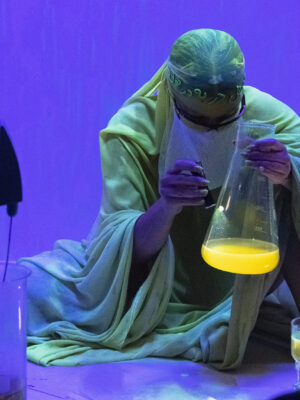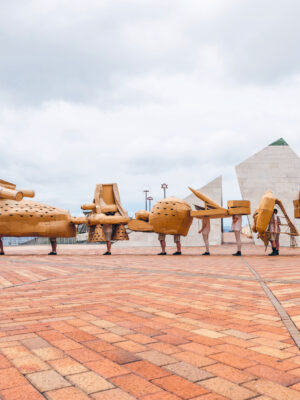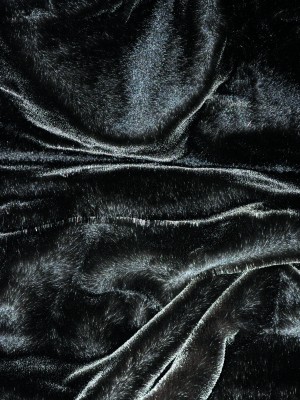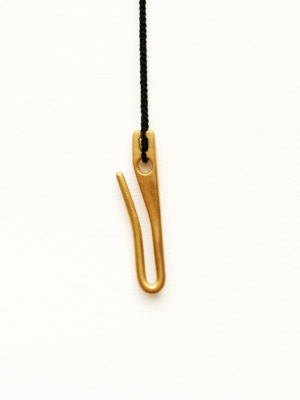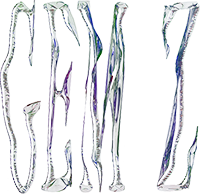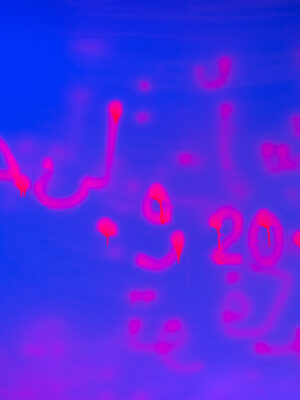
We asked Farvash over a delightful fifty-five minutes, to elaborate for us on how exactly materials engineering intersects with Persian mythology, how her experience transplanting from Iran to Sweden is reflected in her work, and how she manages to meld them all so seamlessly. She illustrates via the example of her recent work, What’s the Matter Oracle?, a bot which, connected to a can of spray paint, receives Persian poetry via text messages in realtime, and slowly sprays them on the wall. Dope.
Farvash Razavi [FR]: The practice is in flux. I mean the cores are that I’m working with science in one way or another, so that’s the material science part. And the other part is that I’m dealing with the trauma of being in the diaspora, but also the privilege of it- like being forced to move from Iran, but at the same time, having more privilege than the people in Iran.
But then the mythology part of it is…somehow trying to understand deep knowledge or Ancestry- you know, this thing that we kind of all have, but we don’t or can’t allow it fully because of the circumstances of our society. And in my case, with the Persian culture in my back and having like all these powerful people, both within my family, but also within my ancestry … I guess I’m just digging, you know? “ she laughs.
And all of this comes together through performance, or through sculptures or installations or any type of expression. So it’s in flux, because it depends on the context either I’m in or I’m going to be in, and then I highlight different aspects of these. So if I’m in a tech situation, then maybe I talk about, like… curiosity, in relation to intuition, and then in relation to capitalism- you know, like how we can’t be curious- and that would be in that type of context.
But if I’m within the art, I obviously can be more personal and, and much more elaborative.
For example, One of my latest works was the spray can robot you send encrypted messages to. I kind of see the logic that, me as a person, the body being here, having the privilege and access to all of this type of information; having access to technology, them not having access to technology.
At the same time, longing for the people and my family in Iran. They are desperate to come here and they find me quite annoying, complaining about being here. And it’s like, ‘How do we kind of merge these two realities or, How do we find a way of accessing these two spaces?’ And a very silly outcome of that was them sending messages to this bot, and then this bot printing it like it’s this Oracle kind of, printing it large in the space, in their own language. And not being forced to adapt using a foreign language such as English… And then as they were printing, the voices were put out in the space and then walking between them was really like walking through their thoughts, and that was so amazing. In a very simple way, it’s like one sending a text message to another one and I was reading it but this whole thing of something appearing in the space- occupying space- and then you’re waiting for the bot to kind of write it in its own tempo, until you get the whole message… That whole magic, really, it became so magical in the sense that you really felt that they were there, like this invisible force- making this.
but I mean I didn’t I didn’t plan any of this.
It was more like, ‘Oh my God, I need to use my privilege. I want to create a portal.’
Not like, ‘Let’s do a spray can robot.’
It just happens.
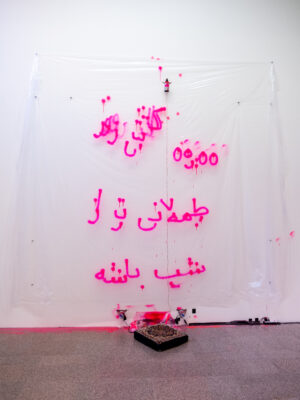
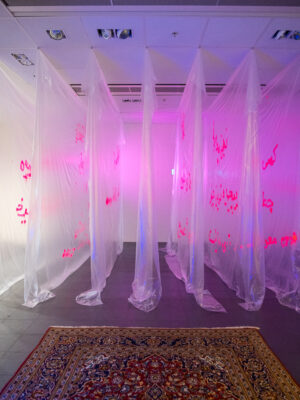
FR: Maybe it’s not that the ideas are so complex. It’s just that I normally don’t know. And I don’t want to be specific, because I work in scale, from the molecule to the experience so it’s difficult to be specific beforehand. So maybe my approach is too complicated.
But so far, I feel like I’ve just been hacking myself through. It’s like a strategy of being able to be on all levels of society in all directions, but then not being fixed. Like being able to be part of a research group, but without being a scientist. Or being able to still be within the slums of Stockholm because that’s where I kind of grew up, and not being too snobby or thinking, ‘I’m too good for this place’. Being able to use that and operate everywhere.
So the core of the work deals with adaptation as a constructed identity strategy; concealment and camouflage as a material quality; and then, the channeling is the 3rd. The channeling is the method of understanding one or the other.
So the Oracle is also something that just changes name from one work to another, like the spray can could be the Oracle. But then in another performative work, maybe I want to be it. It could be the Medium, the one channeling, and it doesn’t matter which body it is – it’s just something embodied- something that has a body that can channel. That is why I find material science so fascinating, it has its body, with embedded knowledge- If it’s physical or digital, if it’s dead or alive, kind of doesn’t matter.

FR: Yeah, super surprised even if I know both from knowledge and experience that technology is controlled by the west. Access to technology in our society is access to power.
Because what happened was that when we programmed it, basically if you write in English the bot understands it. If you write in Farsi, the bot goes like ‘uh??’ So I was super surprised, Okay, and the only reason for that is just not enough people working on it on an open source level, right? And why aren’t enough people working on it? Well enough people don’t have access to it, you know? So it kind of revealed itself, quite simply with, “What do you mean it can’t read Farsi?” It was just so basic.
So we had to take a photo of it to make it work, and when it gets the Farsi message, it reads it as drawings.
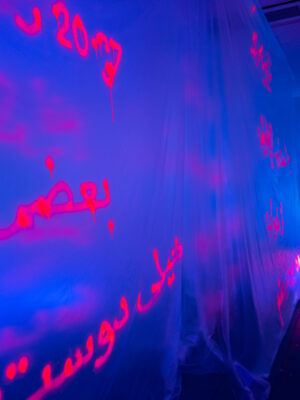
FR: Actually I got a big grant because of this little…discovery. So at the moment we’re working on making an open source; we won’t be able to fill it because it’s just so huge, but we will be able to at least work on it.
Yeah, that’s quite wonderful.
So in that sense I’m using the methods of how you do research within science, but in art – where you kind of intuitively have an idea of something and then you experiment and then you fall upon something and then you use that to make a new project out of it.
Where material engineering is completely governed by, either technology push or market pull. Either a market demands something, or NASA wants to go to the moon and then they invent something. So it’s either like, governed by the military, or the sex industry or the drug industry if it’s the push side.
You asked before about the challenges of trying to present ideas in more complexity and if I have supportive spaces to do so?
The only support I have is that I have people kind of supporting me but I don’t have any institution for that. And I keep coming into an institution and then being bounced out of an institution. More because the HR departments set the boundaries- they dislike me wanting to be fluid and coming in and out. So in this case, it is mostly about the institution and its administrative framework. Though I have been inventing things, have patents, and have worked within research institutions for over a decade and have publications and merits equal to match, my scientist colleagues have to fight most of the time to create a loophole in which we can work. Simply because I don’t want to be employed by someone else telling me what to do, and how to do it.
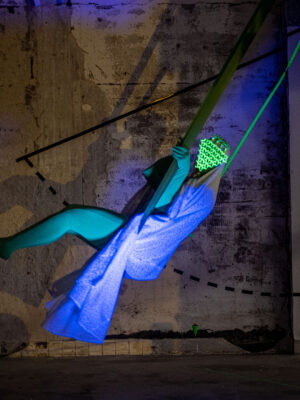
FR: Yeah, exactly. I’m thinking now of Tempo or Duct tape, you know- all these things that they develop through total other purposes and then they become viral because someone else uses them in a different way.
For me, that’s another layer: when you hack the already existing technology and you dock yourself into the platform. Whilst if you want to create, like from the beginning, on this ground-level research, then, that’s more complicated because like, it needs to cure cancer or it needs to have some direct need. Otherwise, it doesn’t get funded.
When I work with my science colleagues, I feel like they have forgotten how to be intuitive within their practice. Or are not being allowed by the structure of the institution. One which is governed by capitalism, so whatever it does, it somehow needs to sell immediately, and have a clear measurable outcome. Because both of those practices are based on curiosity and creativity. Like you can’t really innovate or invent unless you allow yourself to go bananas.
We become creative when we need to solve a problem, but if the scope of the problem is already tangible, the outcome will reflect that. So if you needed to, beforehand, tell what you’re going to do, you won’t do it, it just won’t happen. That’s not how it works.
And that’s why art becomes, more or less, the only platform left that is available for free exploration.
